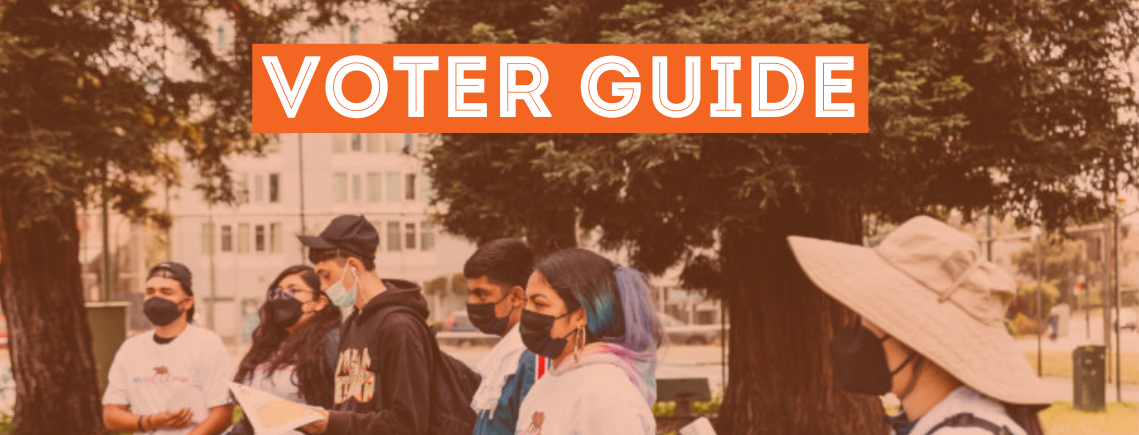Find a complete summary of our 2024 Endorsements here.
YES ON PROPOSITION 2: Fund our schools and community colleges
Students deserve to learn in a safe and healthy environment, but recent data shows that over one-third of California students are enrolled in a school that doesn’t meet minimum facility standards. Due to delays in repair and renovation, many districts have resorted to repurposing gymnasiums as cafeterias and using auxiliary classrooms.
Prop 2 would enable California to borrow $10 billion to allow schools and community colleges to address hazardous mold, leaky roofs, and septic systems; build classrooms; modernize science labs; and replace aging buildings. If this bond does not pass, the current funds for school repairs will be completely depleted by January 2025.
Research indicates that student learning is boosted when education facilities are modernized, climate-controlled, and have updated electrical infrastructure. Voting YES on Proposition 2 will provide a meaningful funding stream to allow more students to have access to technology and classroom environments that will improve learning outcomes.
This bond will also go to community colleges, whose student population is disproportionately low-income and BIPOC. Students of color make up 60% of community college enrollment in California. Funding repairs and ensuring basic health standards are met is also about ensuring community college students get to feel safe on campuses, just like their counterparts at more affluent colleges.
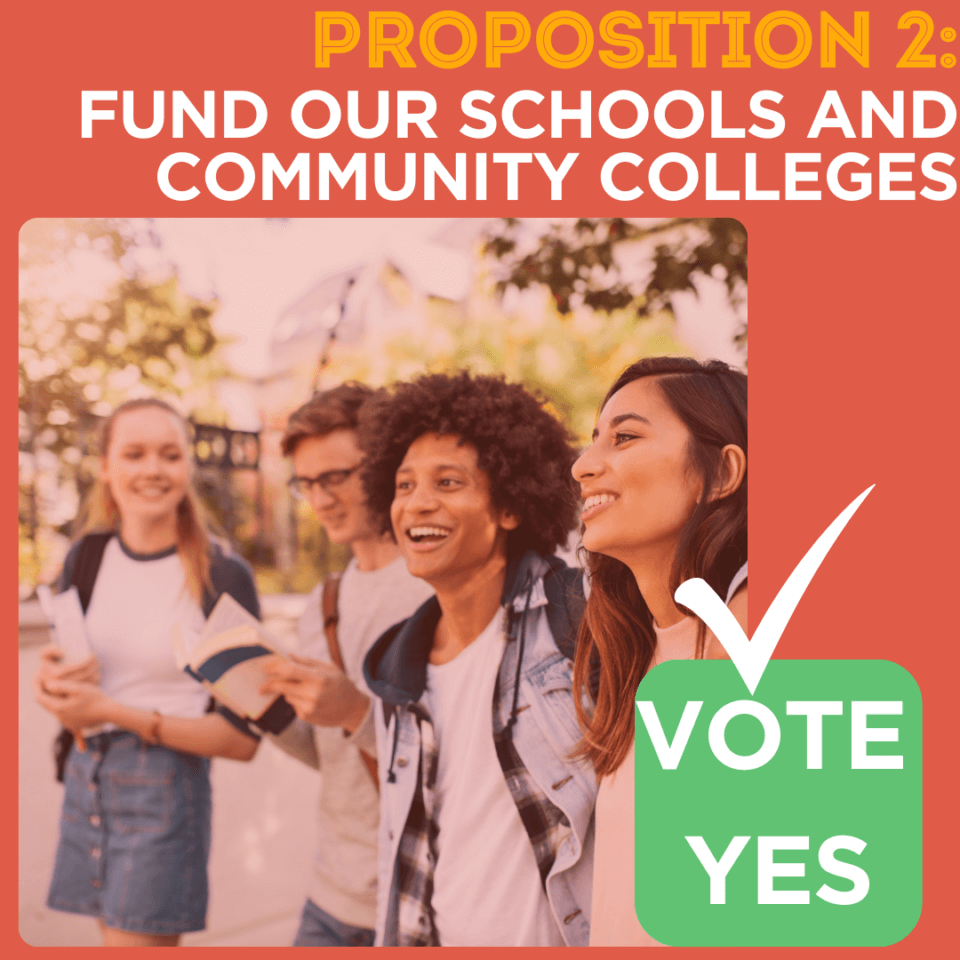
YES ON PROPOSITION 3: Protect Same-Sex Marriage
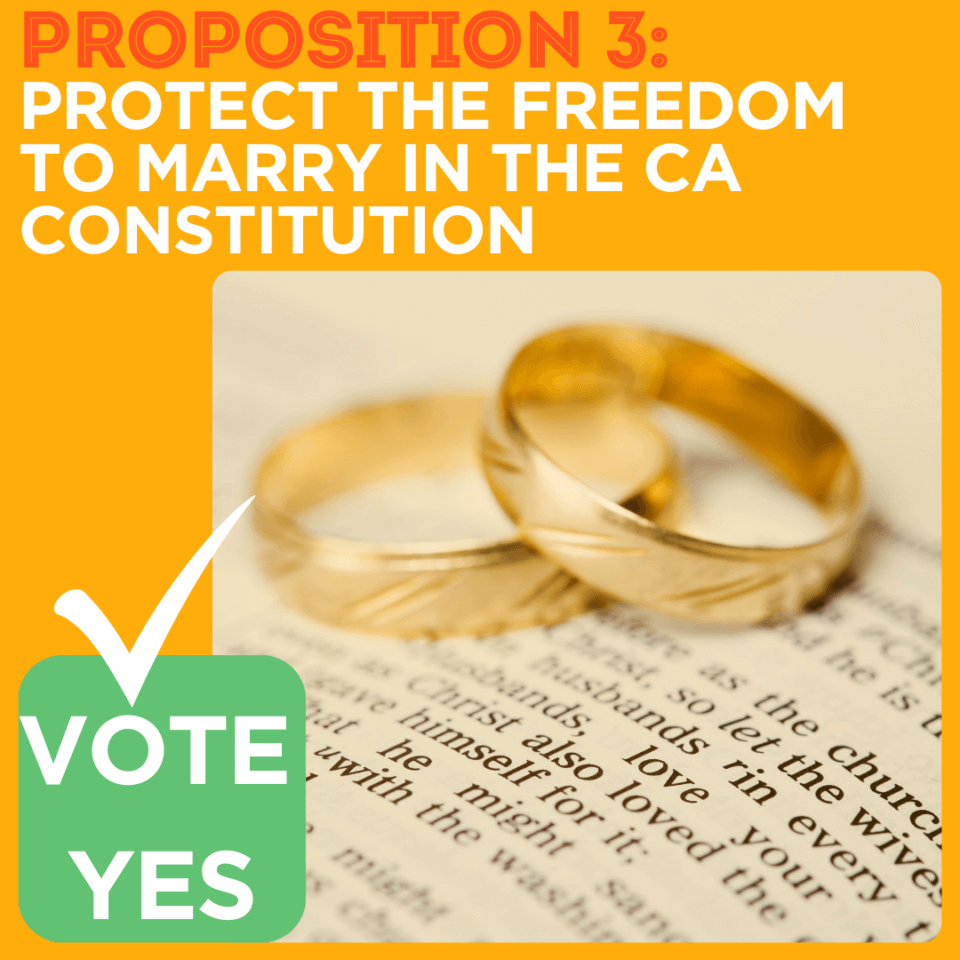
California’s Constitution retains language that “Only marriage between a man and a woman is valid or recognized in California.” While landmark decisions by the U.S. Supreme Court have rendered this language unenforceable, recent decisions have shown that the Supreme Court is willing to upend decades of precedent and revoke hard-earned rights. This type of non-inclusive, heteronormative language hurts LGBTQIA+ communities and has no place in our state constitution. Prop 3 will wipe discrimination from the California Constitution and protect the fundamental right to marry for same-sex and interracial couples.
While marriage equality is protected nationally, LGBTQIA+ communities continue to be targeted by discriminatory legislation across the country. A YES vote would reaffirm California’s commitment to protecting the rights of these communities.
YES ON PROPOSITION 4: Fund environmental justice
Prop 4 would allow California to borrow $10 billion to fund climate preparedness in state and local parks, environmental protection projects, and flood protection projects.
This proposition would enable the state to raise funds urgently needed for a variety of climate projects, including: $3.8 billion for safe drinking and groundwater projects,
- $1.5 billion for wildfire protections,
- $1.2 billion for coastal infrastructure efforts,
- $1.2 billion to protect biodiversity,
- $450 million for extreme heat mitigation.
With a focus on water, wildfire, and the coast, this funding is designed to create present-day solutions that will stop or reverse existing climate challenges and mitigate the need for more expensive projects in the future.
Over 1 million Californians do not have easy access to safe, affordable, and clean drinking water. This bond money would help change that by funding projects to keep toxic pollution out of our water and improve air quality. At least 40% of the money in this bond would go towards projects that address issues faced by low-income communities, disproportionately impacted by climate change.
Living in a safe and clean environment is a basic human right. A YES vote on Prop 4 will help ensure that right for communities throughout our state, even as the climate crisis gets worse.
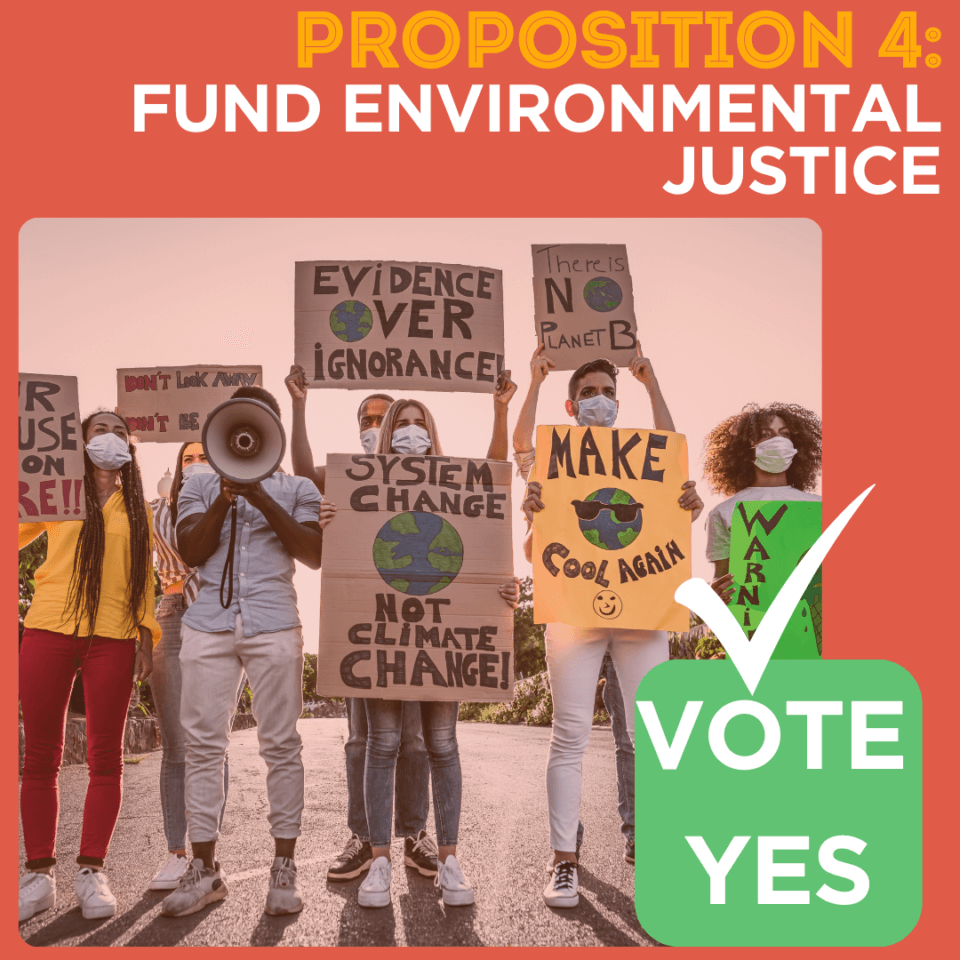
YES ON PROPOSITION 5: Make it easier to raise funds for housing and safety

California is facing a housing crisis, with a growing number of families facing homelessness and and struggling with high housing costs. At the same time, our critical infrastructure like roads, bridges, and water systems is aging and becoming unsafe.
Our local governments are limited in their ability to address these problems because state law currently restricts the ability of local voters to approve housing and public infrastructure bonds for their communities. Right now, a minority of voters are able to block funding for these critical needs because any new bond has to get support from two-thirds of voters, instead of a simple majority. Prop 5 empowers local voters to approve bonds for affordable housing, critical public infrastructure, and emergency response in our communities with a 55% vote – as long as those bonds have strict accountability and oversight.
Our cities and counties should have the tools we need to improve our neighborhoods and address community needs. If Prop 5 passes, it will be easier for local governments to borrow money to fund affordable housing and permanent supportive housing, public infrastructure projects to protect property from sea level rise, control floods, improve streets and highways, expand broadband internet access, and build more local hospitals, community parks, recreation facilities, and public libraries. We’re recommending a YES on Prop 5 so cities can use all the tools in their toolkits to give community members what we need to thrive.
YES ON PROPOSITION 6: Ban slavery in California
In our state constitution, slavery is prohibited except as punishment for a crime. This discriminatory language reflects the troubling notion that people who are incarcerated are less than human and not deserving of basic rights like the rest of us. Considering that a disproportionate number of incarcerated people are Black, Latinx, and Indigenous, the racist implications of this language become clear. Advocates have called this line in our state constitution an extension of slavery, granting our state the power to force incarcerated people to work with nearly zero pay, under harsh working conditions, and without a say in what kind of work they do. This type of labor wouldn’t be acceptable anywhere else, and it shouldn’t be acceptable in our legal system either.
This November, California voters have the opportunity to remove this discriminatory language from our state constitution and ban forced prison labor by voting YES on Prop 6. Passing Proposition 6 would join California with over 30 other states that have struck down the archaic practice of involuntary servitude in their state constitutions.
Most people who are forced to do labor in prisons get paid between $0.08-0.74 an hour, a wage that would sound the alarm bells if it were being paid to any other employees and bring lawsuits against any other employers. While the measure doesn’t guarantee an improvement in the pay scale for people who are incarcerated, it opens up a possibility that they would be paid minimum wage for the work they did. What Prop 6 would guarantee is that workers wouldn’t be forced to perform work they didn’t want to.
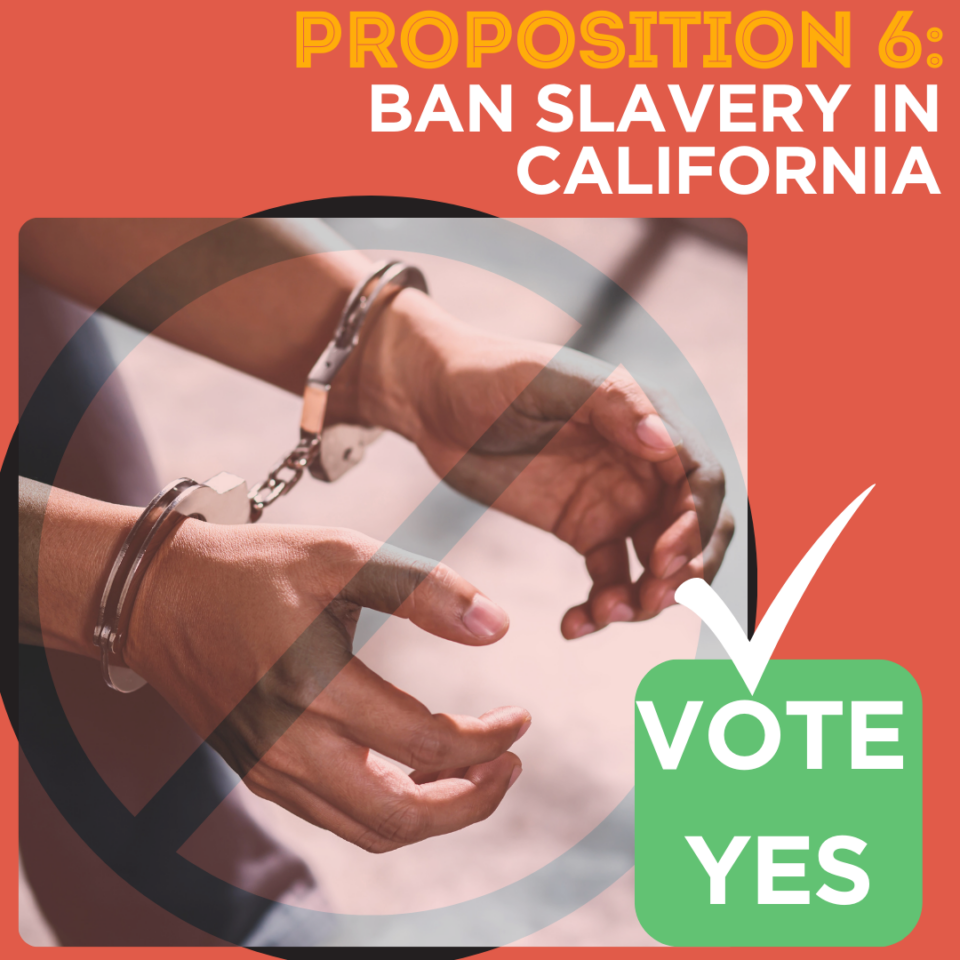
YES ON PROPOSITION 32: Raise Minimum Wage
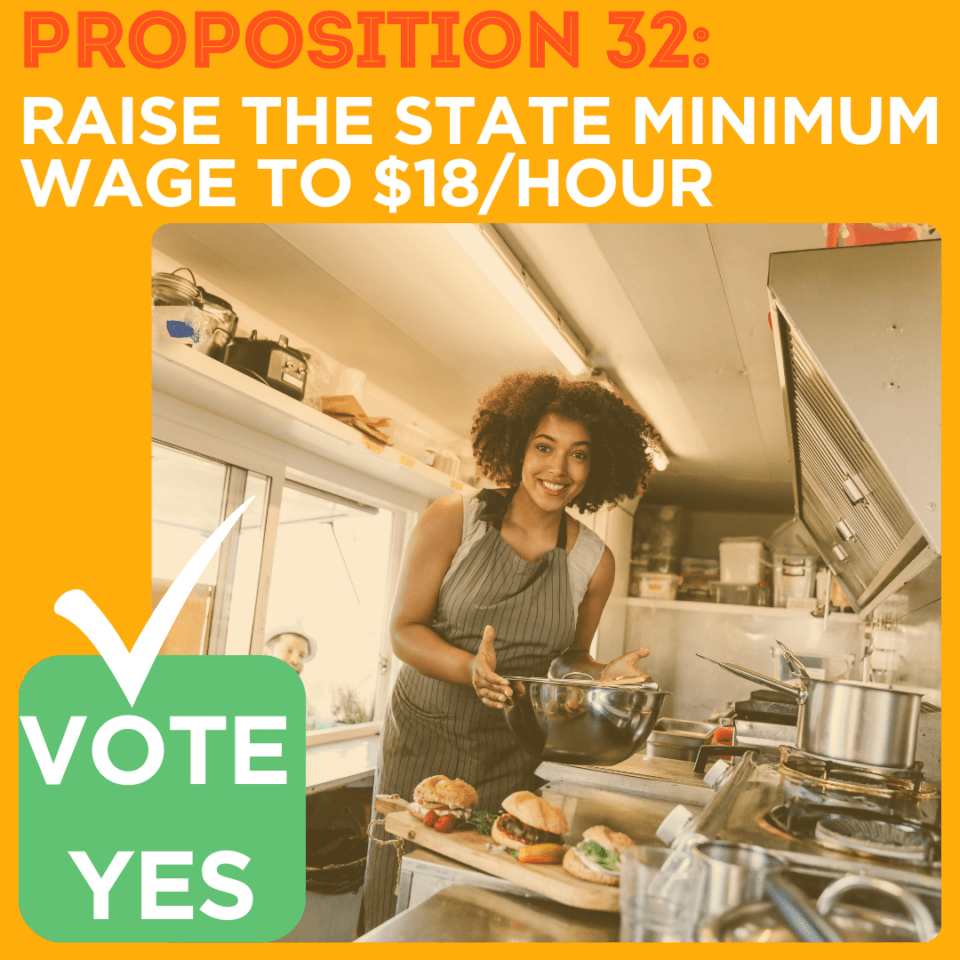
The last time California raised its minimum wage was in 2016. While the cost of everything – housing, gas, food, tuition – has gone up in the past 8 years, the minimum wage has not kept up with the full cost of living. By raising the minimum wage to $18/hour, more Californians will be able to pay their bills, afford housing, get the healthcare they need, and even seek a higher education without taking on mountains of debt. We’ll also be sending a message that all labor is skilled, all labor is important, and all labor deserves a thriving wage.
California currently has the eight-highest income inequality in the country, which pushes many working-class households into poverty. Instead of punishing people for being poor through harsh crime measures, Prop 32 will help make sure that more Californians have what they need to succeed, getting to the root cause of why crime happens in the first place.
YES ON PROPOSITION 33: Allow cities to expand rent control
Many of us struggle to pay rent. California has the second-highest monthly rent rate in the country, and Bay Area rents are among the worst. Homelessness is also growing in California faster than in any other state in the country. For too long, greedy developers and corporate landlords have dictated the housing market, leaving working-class communities to foot bills that we could never afford with our wages.
A key solution to our affordable housing crisis is rent control. This November, voters will get a chance to make it easier for local governments to put caps on how much landlords can increase the rent for tenants. Prop 33 would repeal a state law that bans local governments from capping rent on certain units, giving room to better control rent spikes.
We all deserve to stay in the places we call home – but with sky-high rent increases, working-class families and community members are getting pushed out of their homes. Let’s make it easier for local governments to cap rent increases and allow working people to afford their rent.
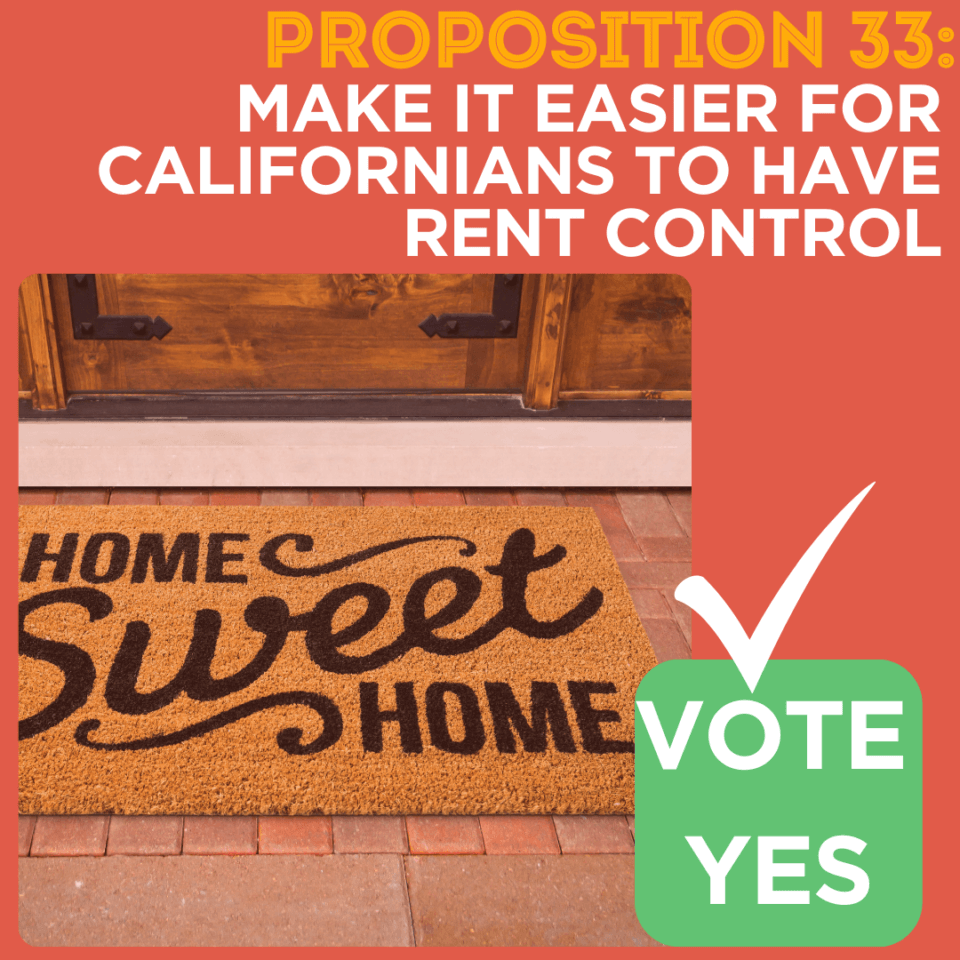
NO on Proposition 34: Make it harder to pass rent control
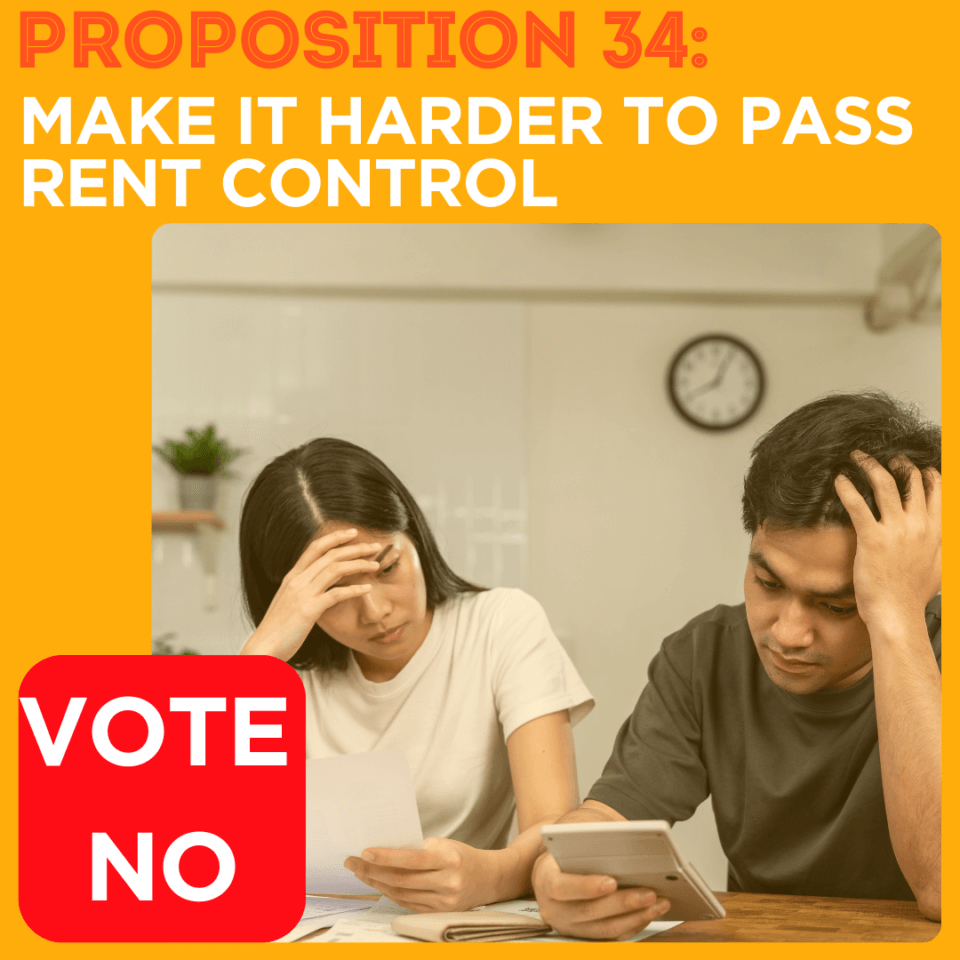
Proposition 34 is a real estate industry effort targeting the AIDS Healthcare Foundation to keep the organization from funding future ballot initiatives. The AIDS Healthcare Foundation is the only organization in the state that would meet the criteria outlined in the measure. This measure is backed by the real estate industry and is a veiled attack on the foundation because it has put a lot of money into supporting rent control efforts in recent years. Meant to deceive voters under the guise of being about healthcare, Prop 34 will prevent the AIDS Foundation from funding rent control measures in the future.
Technically, it would require California healthcare providers who meet specific criteria to spend at least 98% of profits from drug sale revenue on direct patient care. Don’t fall for this tricky anti-tenant measure: vote NO on Prop 34.
YES on Proposition 35: Protect access to free and affordable healthcare
Prop 35 would help raise more money for Medi-Cal, a health insurance plan for low-income Californians. Over 15 million Californians depend on Medi-Cal for health care. Children, people with disabilities, and elders particularly lean on Medi-Cal. But without adequate funding, Medi-Cal may not be able to continue to be a lifeline for millions in our state.
The money that Prop 35 would generate would be raised through a permanent tax on certain health insurance providers without imposing any taxes on individuals. The measure would ensure that the money is used for its intended purpose – to fund Medi-Cal – by preventing lawmakers from rerouting the funds towards something else and requiring that 99% of the funding to go directly to patient care.
The funding raised would be used to hire more first responders and paramedics to reduce emergency response times, address workforce shortages, expand access to preventative health care, reduce wait times in emergency rooms, and for specific care such as family planning, cancer treatment, and mental health treatment.
As we recover from the COVID-19 pandemic, we know that we need to take healthcare seriously. A YES vote on Prop 35 means that Medi-Cal can continue to be a lifeline for low-income Californians and improve health care for millions of patients.
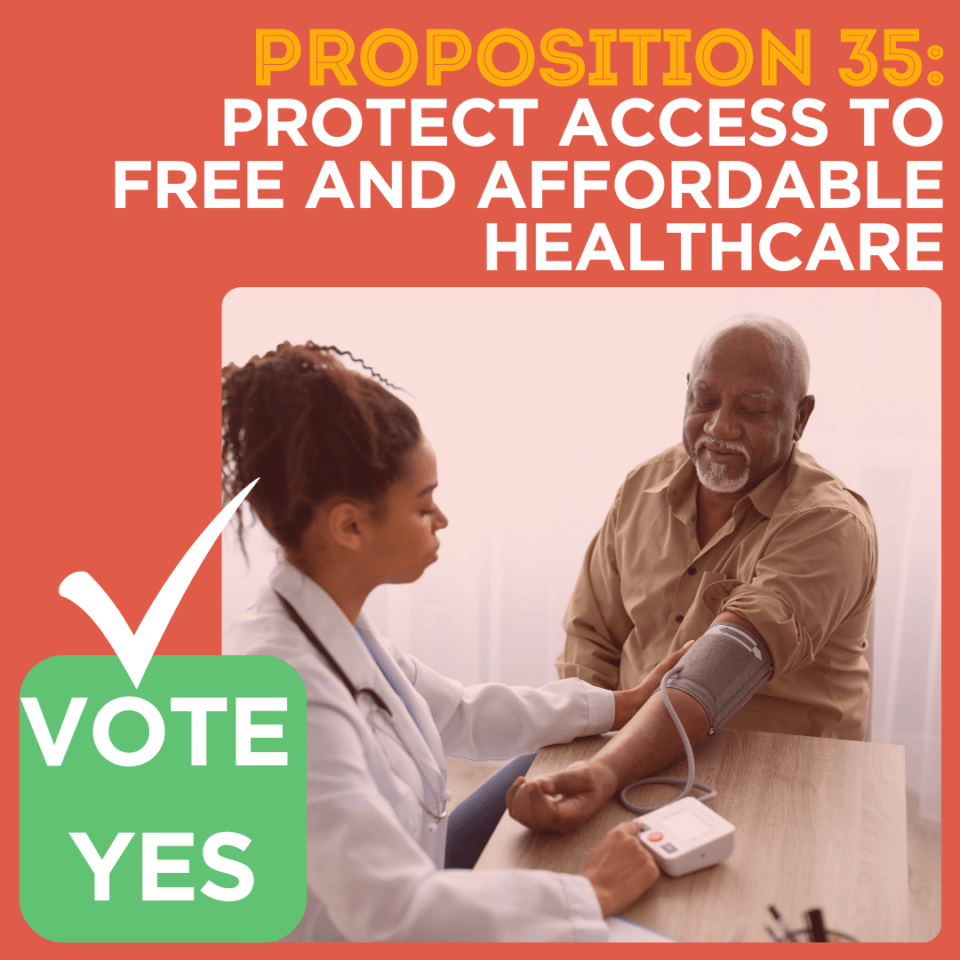
NO on Proposition 36: Roll back progressive criminal justice reform
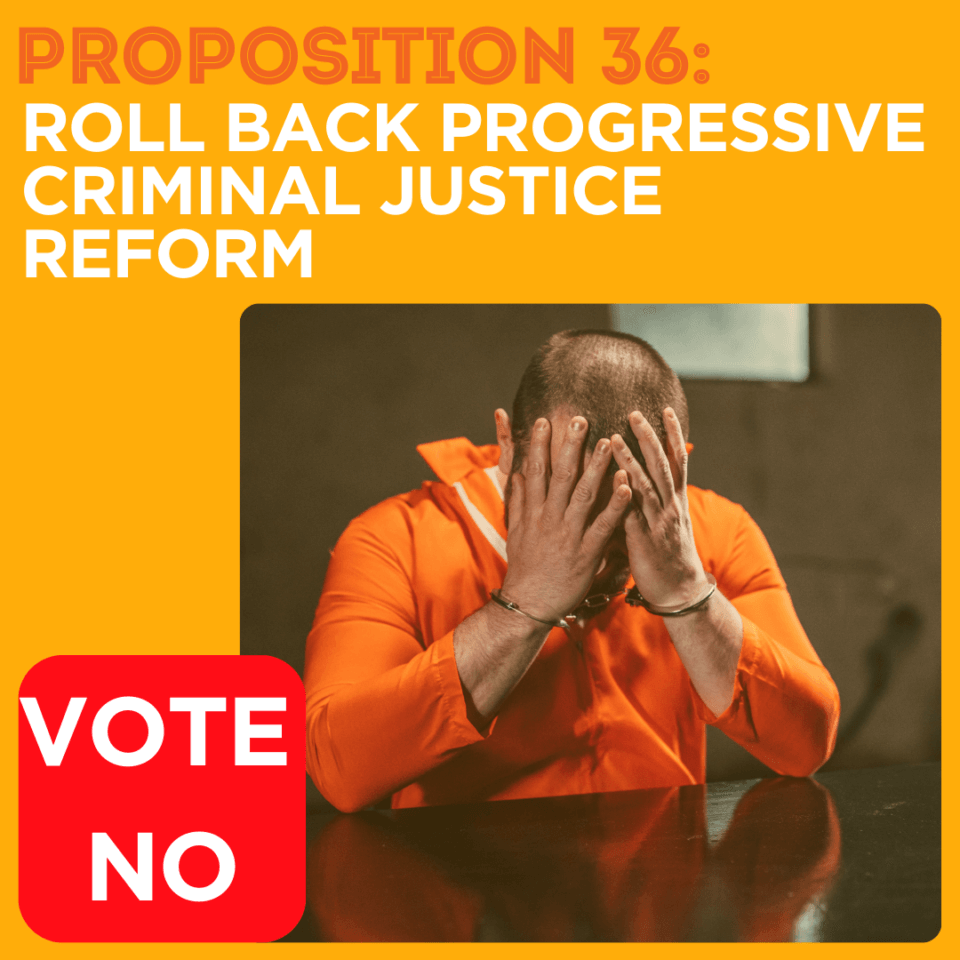
It’s no secret that crime has been at the top of Californians’ minds for years now. No matter our zipcode, background, or political party, we all want to feel safe when we go out into our neighborhoods. That’s why it’s understandable that quick fixes like Prop 36 to address complex issues like public safety may seem appealing. But this dangerous measure would actually reduce investment in proven strategies to support those most at risk. During the past ten years, we changed the government’s response to people in our communities making mistakes or being involved in a crime, by giving second chances and supporting people through rehabilitation. As a result, the number of repeat crimes have been reduced by more than half, and people in our communities have been getting help with returning to their neighborhoods.
In 2014, California voters passed Proposition 47 with over 59% of the vote to reclassify some non-violent crimes from felonies to misdemeanors, including low-value shoplifting. This change effectively reduced the state’s prison burden and allowed the government to divert funds previously used for incarceration to rehabilitation and re-entry programs. Proposition 36 would upend the progress that Proposition 47 established to increase community investment in real solutions to crime including: mental health services, substance use treatment, and diversion programs, and refocus on mass incarceration. Proposition 36 would increase the sentence for possession of certain quantities of illegal drugs, adding fentanyl to the list of illegal drugs that can warrant a felony charge, and making low-value property theft a felony for repeat offenders. Voting NO will ensure that California remains focused on rehabilitation and re-entry programs for individuals involved in low-level crime.
A fiscal impact statement associated with Proposition 36 estimates that it will ultimately result in a price tag of hundreds of millions of dollars annually in court costs and the expense of housing an increased prison population. Voting NO will allow these critical funds to continue to be spent on truancy, youth services, rehabilitation, and substance use treatment programs.
Californians deserve real answers to crime, not just a reactionary, haphazardly-designed measure that would only take us backwards in the progress we’ve made with criminal justice reform and fail to address the root causes of crime. NO on Prop 36.
Ad paid for by Bay Rising Ballot Action Committee sponsored by Center for Empowered Politics.
Committee major funding from:
Katrina Schaffer
Not authorized by a candidate or a committee controlled by a candidate.


